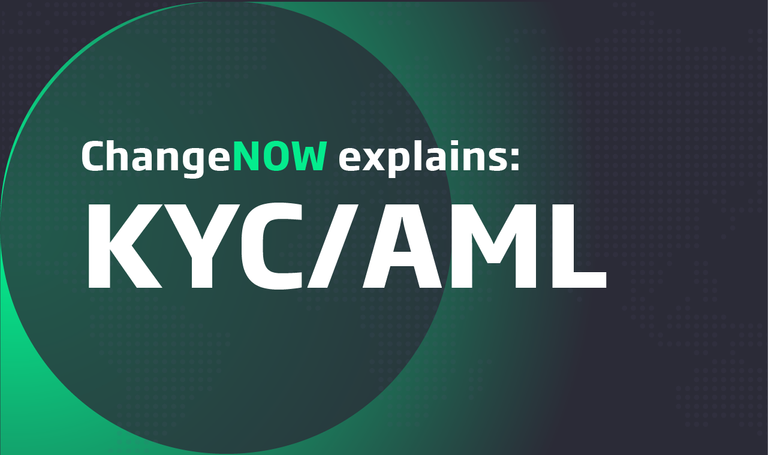
ChangeNOW does everything possible to meet the standards of operation on the cryptocurrency market. The most important step is to counter money-laundering. To prevent trafficking, ChangeNOW has a KYC/AML policy.
What is KYC/AML
KYC stands for Know Your Customer. AML is for Anti-Money Laundering. Cryptocurrencies are often considered to be used for illegal operations that allow you to withdraw money from the shadows. In order to prevent this, it is necessary to take measures to ensure customer verification and security of financial transactions.
KYC/AML policy is used in many countries. The main scope of its usage is the activities related to the conduct of questionable transactions. For example, gambling (online casino activities) or certain types of financial services are among them.
States are doing everything possible to control and limit the activities of such organizations, and to introduce them into the framework of the law. The KYC/AML policy remains the most common method for this. Its application convinces the regulatory authorities of the absolute legality of the transaction carried out by you. Thus, you confirm that you are a law-abiding citizen and the state has no reason to address any claims towards you.
Benefits of the KYC/AML policy for the customer
The conservative part of the crypto community protests against KYC/AML. They believe that it threatens the main principle of cryptocurrencies — the anonymity of financial transactions. However, there are many cases when the KYC procedure helps avoid financial theft and an ordinary client gets a number of advantages with this policy.
Most money services businesses have transaction risk management systems implemented. Thus, If a transaction falls under the suspicious transaction criteria, the client in question is asked to pass KYC. Law-abiding customers pass the KYC procedure as quickly as possible by cooperating and providing all the necessary information, while hackers and thieves might be stopped and handed over to law enforcement.
Let’s review some cases as examples:
- Someone has a wallet with a lot of crypto on it. They lose access to their wallet because their private key was stolen. They turn to a law enforcement agency, such as Europol or Interpol. The law enforcement agency initiates an investigation, during which they carry out a blockchain analysis and spread the information about stolen funds to exchanges and exchange services in a form of a certain wallet addresses blacklist. When the thief attempts to move the funds somewhere, e.g. through an exchange service, in most cases the exchanger’s suspicious transaction detection system detects the transaction and the exchange is stopped. The user is then asked to verify themselves. If the KYC procedure fails, the funds are frozen by the exchanger; they are then handed over to a law enforcement agency after a court order.
- A big crypto wallet was hacked, a large amount of private keys was stolen and funds were transferred to multiple addresses. A blockchain analysis by a law enforcement agency is then carried out and the stolen wallets are then blacklisted. If someone tries to move the stolen funds from such a wallet through an exchanger or exchange, they have to pass AML/KYC. If they fail to provide an ID and a coherent source of funds, the transaction is stopped, the funds are frozen, and the funds are then returned to their rightful owners after a court order.
- A crypto exchange is hacked and a big amount of funds is stolen and transferred to multiple wallets. After a blockchain analysis by law enforcement those addresses are then blacklisted. After that, the situation is controlled similarly to the previously described case.
People can also use crypto to finance a whole variety of illegal activities, such as drugs and weapons trafficking, terrorist operations, huge scams and swindling, etc. AML/KYC allows people to have relative financial freedom while not letting crypto become the means of funding crime.
ChangeNOW has an automated risk prevention system implemented. If a transaction is marked suspicious by this system, the exchange is delayed and the customer in question is then asked to pass KYC in a form of an ID check. There is a certain set of criteria that the system employs; however, they can’t be made public, otherwise there will be people who will try to abuse those criteria in order to cheat the algorithm. This system has proven to be very useful against money launderers and scammers, since the KYC process allows us to tell an honest customer apart from a scammer very quickly and without any trouble. If there are any problems with the ID checking procedure, for example, if a customer fails the verification process by sending us a fake ID picture, an investigation will be launched.
We do everything in our power to maintain our reputation as a legitimate, law-abiding exchange service that can be safe for use by anyone, be it a regular person who doesn’t deal with crypto much or an experienced trader or miner. We also offer the largest variety of cryptocurrencies available for exchange. ChangeNOW is your opportunity to choose the right solution.
Don't forget to check the diamond topic before using this "company"
https://bitcointalk.org/index.php?topic=4619534.0 - ChangeNow.io (Evercode Lab) - Scam. Illegally holding of 100 BCH (11 bitcoins)